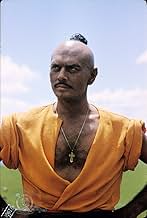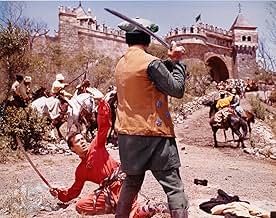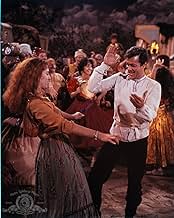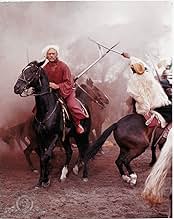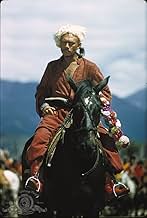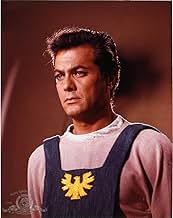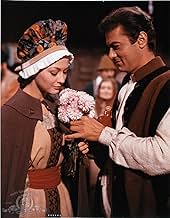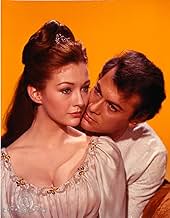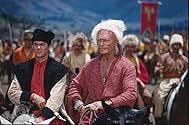Taras Bulba
- 1962
- Tous publics
- 2h 2m
IMDb RATING
6.3/10
4.8K
YOUR RATING
In the 16th-century Ukraine, the Polish overlords and Ukrainian cossacks fight for control of the land but frequent Turkish invasions force them to unite against the common Turkish foe.In the 16th-century Ukraine, the Polish overlords and Ukrainian cossacks fight for control of the land but frequent Turkish invasions force them to unite against the common Turkish foe.In the 16th-century Ukraine, the Polish overlords and Ukrainian cossacks fight for control of the land but frequent Turkish invasions force them to unite against the common Turkish foe.
- Director
- Writers
- Stars
- Nominated for 1 Oscar
- 3 nominations total
Leon Alton
- Servant
- (uncredited)
- Director
- Writers
- All cast & crew
- Production, box office & more at IMDbPro
Featured reviews
How does one choose between the life of a person you love and your father, your family, your nation? The moral dilemma presented in "Taras Bulba" would be a tough sell in any era, but particularly in "last year of the 50s" ("American Graffitti"). Producer Ben Hecht, screenwriter and director J. Lee Thompson pull no punches. However, one can only wonder how great a film "Taras Bulba" would have been if directed by, say, David Lean and the love story expanded. As it stands, the movie is wildly uneven. The Kiev sequences tend to bog down the movie; while, at the same time the romantic scenes play too quickly for dramatic impact. Curtis' well publicized adulterous affair with actress Christine Kaufman certainly didn't help box office; and, it seems the screen careers of both Curtis and Yul Brynner were permanently damaged, as both went into decline after "Taras Bulba". Sad and ironical, since Curtis recently revealed he was legally separated from wife Janet Leigh for over a year before embarking on "Taras Bulba" (and his liaison with Kaufman); and, in any event, adulterous marriage breakups certainly didn't hurt Liz Taylor. It's all a pity, because "Taras Bulba" is an exciting, profound movie, the kind we are most used to seeing recently from China ("Hero," "House of Flying Daggers," "Crouching Tiger, Hidden Dragon").
Director J. Lee Thompson ("The Guns of Navarone") makes excellent use of the widescreen process, filling the entire frame with action. I say this, seeing only the full screen version, since it is clear from what remains there was plenty to fill the screen, while key action was wisely staged center screen.
Curtis is effective in the difficult role of Andre, Taras Bulba's son. However, Yul Brynner is phenomenal as Taras Bulba. Too bad he's not on screen more. Christine Kaufman is decorative, but her scenes with Curtis are too meager to be truly effective.
One hopes a widescreen DVD soon becomes available; or, at least, Turner or ENCORE ACTION shows the movie in letterbox. The version I previewed on FLIX showed some signs of damage. Flawed or not, "Taras Bulba" is well worth an "8" on my scale of 10.
Director J. Lee Thompson ("The Guns of Navarone") makes excellent use of the widescreen process, filling the entire frame with action. I say this, seeing only the full screen version, since it is clear from what remains there was plenty to fill the screen, while key action was wisely staged center screen.
Curtis is effective in the difficult role of Andre, Taras Bulba's son. However, Yul Brynner is phenomenal as Taras Bulba. Too bad he's not on screen more. Christine Kaufman is decorative, but her scenes with Curtis are too meager to be truly effective.
One hopes a widescreen DVD soon becomes available; or, at least, Turner or ENCORE ACTION shows the movie in letterbox. The version I previewed on FLIX showed some signs of damage. Flawed or not, "Taras Bulba" is well worth an "8" on my scale of 10.
Taras Bulba is directed by J. Lee Thompson and adapted to the screen by Waldo Salt and Karl Tunberg from a story by Nikolai Gogol. It stars Yul Brynner, Tony Curtis, Christine Kaufmann and Perry Lopez. Out of United Artists, it's a DeLuxe/Eastman Color/Panavision production, with the music scored by Franz Waxman and cinematography by Joseph MacDonald.
Loosely based on Gogol's short novel, story tells of a Cossack uprising against the Polish forces who have taken control of the Ukraine. At the centre of the Cossack army is the leader Taras (Brynner) and his two sons, Andrei (Curtis) and Ostap (Lopez). But when Andrei falls in love with a Polish princess called Natalia (Kaufmann), it sets the wheels in motion for the Bulba family to crack from within; just as the Polish come calling asking for the Cossacks' help to defeat the Turkish.
While not as epic as the film, the troubled back story of the production is big enough to lend one to understand why Taras Bulba is not the grandiose picture the story deserves. Main problem comes with casting, particularly that of Curtis as the elder Bulba son. It should have been Burt Lancaster, who walked, so in came Curtis and a decision was made to put him front and centre of the picture. Thus rendering Brynner's title character to playing second fiddle, so much so they really should have called the film Andrei Bulba instead. On his day Curtis could act, but he's out of place here playing a Cossack with brain and brawn. Then there was the small matter of Curtis' marriage to Janet Leigh falling apart, with Leigh visiting the set, falling ill and no doubt noticing the sparks flying between Curtis and his delectable co-star, Kaufmann. Curtis would say it wasn't the final straw, but with him going on to marry Kaufman shortly after his divorce, it's hard not to think that it sealed the deal!
He's not helped by the writers, though, who allow the love story sub-plot between Andrei and Natalia to form the core of the plot. They too, Messrs Salt & Tunberg, were brought in after historical novelist Howard Fast (Spartacus) refused to tone down the screenplay. He wanted to include what was an important part of the Cossack/Pole war, that of the Cossacks anti-Semitic attack on Polish Jews. The makers balked and Salt & Tunberg came in and delivered the Andrei overkill and some rather cheese laden dialogue. Brynner was crushed, his biography (written by his son Rock) reveals that it was a role and film he cared for more than any other, he had grand plans for the portrayal but the makers didn't share his view. A shame because what we do get of Brynner is wonderfully exuberant, muscular and (correctly) scene stealing.
However, when Taras Bulba as a film is good, it's real good, and thankfully it's never dull, even if it's a bit more jovial in the mid section than it is meant to be. Thompson was a fine director of action and suspense, and he gets to flex his muscles here to great effect. Casting aside the cheap shots of dummies and wooden horses being hurled about a couple of times, the sight of thousands of men on horseback swarming across the Steppes (actual location used was Argentina) is spectacular. The battles are fierce, violent and gripping, while the scenes in the Cossacks camps are joyous as men drink, sing, test their manhood by doing things like dangling over a bear pit, it's all very robust and Vikingesque, but entertainingly so. There's even some dashing sword play, while quality suspense is eked out during a challenge to the death over a seemingly bottomless gorge.
Joseph MacDonald's Panavision photography neatly brings the wide vistas to life, aided by the use of Eastman Color which gives off a nice period hue. Waxman delivers a blunderbuss score that's seasoned with Russian vitality, while the costume department deserves a mention for their efforts, particularly for the Polish army who look dandy men of steel. Yes it's a film of flaws and bad decisions, but the good does outweigh the bad in this instance, and how nice it is to have the chance to see a little known part of "bloody" history up there on the screen. 7/10
Loosely based on Gogol's short novel, story tells of a Cossack uprising against the Polish forces who have taken control of the Ukraine. At the centre of the Cossack army is the leader Taras (Brynner) and his two sons, Andrei (Curtis) and Ostap (Lopez). But when Andrei falls in love with a Polish princess called Natalia (Kaufmann), it sets the wheels in motion for the Bulba family to crack from within; just as the Polish come calling asking for the Cossacks' help to defeat the Turkish.
While not as epic as the film, the troubled back story of the production is big enough to lend one to understand why Taras Bulba is not the grandiose picture the story deserves. Main problem comes with casting, particularly that of Curtis as the elder Bulba son. It should have been Burt Lancaster, who walked, so in came Curtis and a decision was made to put him front and centre of the picture. Thus rendering Brynner's title character to playing second fiddle, so much so they really should have called the film Andrei Bulba instead. On his day Curtis could act, but he's out of place here playing a Cossack with brain and brawn. Then there was the small matter of Curtis' marriage to Janet Leigh falling apart, with Leigh visiting the set, falling ill and no doubt noticing the sparks flying between Curtis and his delectable co-star, Kaufmann. Curtis would say it wasn't the final straw, but with him going on to marry Kaufman shortly after his divorce, it's hard not to think that it sealed the deal!
He's not helped by the writers, though, who allow the love story sub-plot between Andrei and Natalia to form the core of the plot. They too, Messrs Salt & Tunberg, were brought in after historical novelist Howard Fast (Spartacus) refused to tone down the screenplay. He wanted to include what was an important part of the Cossack/Pole war, that of the Cossacks anti-Semitic attack on Polish Jews. The makers balked and Salt & Tunberg came in and delivered the Andrei overkill and some rather cheese laden dialogue. Brynner was crushed, his biography (written by his son Rock) reveals that it was a role and film he cared for more than any other, he had grand plans for the portrayal but the makers didn't share his view. A shame because what we do get of Brynner is wonderfully exuberant, muscular and (correctly) scene stealing.
However, when Taras Bulba as a film is good, it's real good, and thankfully it's never dull, even if it's a bit more jovial in the mid section than it is meant to be. Thompson was a fine director of action and suspense, and he gets to flex his muscles here to great effect. Casting aside the cheap shots of dummies and wooden horses being hurled about a couple of times, the sight of thousands of men on horseback swarming across the Steppes (actual location used was Argentina) is spectacular. The battles are fierce, violent and gripping, while the scenes in the Cossacks camps are joyous as men drink, sing, test their manhood by doing things like dangling over a bear pit, it's all very robust and Vikingesque, but entertainingly so. There's even some dashing sword play, while quality suspense is eked out during a challenge to the death over a seemingly bottomless gorge.
Joseph MacDonald's Panavision photography neatly brings the wide vistas to life, aided by the use of Eastman Color which gives off a nice period hue. Waxman delivers a blunderbuss score that's seasoned with Russian vitality, while the costume department deserves a mention for their efforts, particularly for the Polish army who look dandy men of steel. Yes it's a film of flaws and bad decisions, but the good does outweigh the bad in this instance, and how nice it is to have the chance to see a little known part of "bloody" history up there on the screen. 7/10
Borrowing from Gogol the title ,the proper nouns and the son's killing,Jack Lee Thompson's movie is quite entertaining,ideal for a rainy day or after a hard day's work.
The first part is the most interesting: the scenes at the university with its sadistic monks -while one of them is flogging the rebel students,the other kneels down and pray- and its "racism" : a lot of Pole Students cannot accept the fact that those primitive savage cossacks study in their school.Curtis was almost emasculated "to prevent him from sullying Pole girls." It sometimes recalls"Romeo and Juliette",which Christine Kaufman's resemblance with Olivia Hussey who would play the part of Juliette six years later reinforces.Yul Brynner is ideally cast as Taras.
The 1936 French version ("Tarass Boulba" French spelling)mainly deals with the second part -the siege- and the stories are similar with the same love interest.
The first part is the most interesting: the scenes at the university with its sadistic monks -while one of them is flogging the rebel students,the other kneels down and pray- and its "racism" : a lot of Pole Students cannot accept the fact that those primitive savage cossacks study in their school.Curtis was almost emasculated "to prevent him from sullying Pole girls." It sometimes recalls"Romeo and Juliette",which Christine Kaufman's resemblance with Olivia Hussey who would play the part of Juliette six years later reinforces.Yul Brynner is ideally cast as Taras.
The 1936 French version ("Tarass Boulba" French spelling)mainly deals with the second part -the siege- and the stories are similar with the same love interest.
I've seen the reviews here and a couple of comments set "Taras Bulba"'s location in the Argentine pampas. As a native Argentine I must say that's not correct; the pampas run all through the middle part of our Country but this film was shot in the Province of Salta way up in the northern part of Argentina (some 1400 miles from Buenos Aires); the pampas are a huge flat ground very fertile, but Salta is uneven with not too high hills ("cerros") very different from the pampas. Another reviewer says Tony Curtis declared once that when he and co-star Kristine Kaufmann got mixed up during the filming he was already divorced of Janet Leigh; I don't know about that but I can assure you that Leigh came to Salta with him (a friend of mine has a photo with her on the "cerros").
As to the picture, I really enjoyed it -also because I lived in Salta a couple of years and the landscape is very familiar to me- but I think a real classical epic could have come out of Nicolai Gogol's famous novel with a more elaborated script (as a reviewer correctly stated here).
J. Lee Thompson's product seems sort of "cheap" and lacks spectacle (except for some real good battle scenes) although I admit if has some very good moments. A somehow impressive one is when the big doors of the sieged city open slowly and André (Curtis) appears in a frontal close shot wearing a Polish armor and helmet for he will make a run for food too feed the starving citizens inside in a clear treason to his country and father for the love of a woman. Also the final dark atmosphere Thompson achieves when Taras (Yul Brynner) confronts his favourite son after a treason he can't possibly understand and even less when André just explains "I did what I had to do".
Brynner's performance though a little overacted is good enough and he fills the role of Taras easily. Tony Curtis makes a great effort and gets some good moments as André though he clearly lacks the appropriate "physic du rol". The rest of the cast gives a good support, among them Sam Wanamaker, Brad Dexter, Guy Rolfe and George MacReady. German actress Kristine Kauffman shows her beauty.
All in all "Taras Bulba" comes out as an entertaining and amusing film in its genre and a decent intent on Gogol's book, but no much more than that.
As to the picture, I really enjoyed it -also because I lived in Salta a couple of years and the landscape is very familiar to me- but I think a real classical epic could have come out of Nicolai Gogol's famous novel with a more elaborated script (as a reviewer correctly stated here).
J. Lee Thompson's product seems sort of "cheap" and lacks spectacle (except for some real good battle scenes) although I admit if has some very good moments. A somehow impressive one is when the big doors of the sieged city open slowly and André (Curtis) appears in a frontal close shot wearing a Polish armor and helmet for he will make a run for food too feed the starving citizens inside in a clear treason to his country and father for the love of a woman. Also the final dark atmosphere Thompson achieves when Taras (Yul Brynner) confronts his favourite son after a treason he can't possibly understand and even less when André just explains "I did what I had to do".
Brynner's performance though a little overacted is good enough and he fills the role of Taras easily. Tony Curtis makes a great effort and gets some good moments as André though he clearly lacks the appropriate "physic du rol". The rest of the cast gives a good support, among them Sam Wanamaker, Brad Dexter, Guy Rolfe and George MacReady. German actress Kristine Kauffman shows her beauty.
All in all "Taras Bulba" comes out as an entertaining and amusing film in its genre and a decent intent on Gogol's book, but no much more than that.
From Harold Hecht production comes the magnificent presentation of Nicholas Gogol's undying story of the mighty chief charging against the Poles into strange lands of the steps . Taras Bulba with his tribes wager war through the long corridors of courage . At this time Polish rule over Ukraine , they join forces with the Cossacks to vanquish the Turks . One time are defeated they force to the Cossacks to live on bad lands . Taras Bulba (Yul Brynner) sends his sons (originally was hired Burt Lancaster but role subsequently was to Tony Curtis and Perry Lopez) to a Polish school . There they encounter hatred , confrontation , struggles but also love when Curtis is enamored with the daughter (Austrian actress Christine Kauffman , she met Tony Curtis on the set and later married him) of a Polish nobleman .
The film gets noisy action , adventures , romance , jarring burst of violence and results to be quite entertaining . Breathtaking battles well staged with thousands of extras displayed by Army of Argentina where was actually shot . Besides , it contains exciting rider races with bounds and leaps over cliffs as well as horses and men falling into the deep . Actors interpretation is more distinguishing , it features of otherwise routine spectacle . Brynner as a straight-talking , savvy chief leading his tribe is superb . He's perfect as a proud , wise and stalwart leader . Brynner plays one of his usual oriental or exotic roles (similarly to Brothers Karamazov , King and I , Salomon , Ten Commandments). Tony Curtis turns a fine performance . Brynner and Curtis together for the first time , like father and like son in this exciting adventure . Tony Curtis plays Yul Brynner's son, but Curtis was only five years younger than Brynner in real life . Perry Lopez and Curtis are also "college students" , when in real life they are about age of 37 . The secondary casting is frankly good such as : Brad Dexter , Sam Wanamaker , Guy Rolfe , Abraham Sofaer and Vladimir Sokoloff's last film , among others . Spectacular and epic musical score by Franz Waxman . Colorful and glamorous cinematography filmed amid the splendor of its original locale by Joe McDonald . The motion picture was brilliantly directed by J. Lee Thompson (Guns of Navarone , Cape fear) , though in his finale career directed Charles Bronson vehicles . The Nikolai Gogol story titled ¨Taras Bulba¨ was formerly filmed in France (1936) , England (1963) and Italy (1963) by Ferdinando Baldi . The movie will appeal to Yul Brynner fans and costumer enthusiasts .
The film gets noisy action , adventures , romance , jarring burst of violence and results to be quite entertaining . Breathtaking battles well staged with thousands of extras displayed by Army of Argentina where was actually shot . Besides , it contains exciting rider races with bounds and leaps over cliffs as well as horses and men falling into the deep . Actors interpretation is more distinguishing , it features of otherwise routine spectacle . Brynner as a straight-talking , savvy chief leading his tribe is superb . He's perfect as a proud , wise and stalwart leader . Brynner plays one of his usual oriental or exotic roles (similarly to Brothers Karamazov , King and I , Salomon , Ten Commandments). Tony Curtis turns a fine performance . Brynner and Curtis together for the first time , like father and like son in this exciting adventure . Tony Curtis plays Yul Brynner's son, but Curtis was only five years younger than Brynner in real life . Perry Lopez and Curtis are also "college students" , when in real life they are about age of 37 . The secondary casting is frankly good such as : Brad Dexter , Sam Wanamaker , Guy Rolfe , Abraham Sofaer and Vladimir Sokoloff's last film , among others . Spectacular and epic musical score by Franz Waxman . Colorful and glamorous cinematography filmed amid the splendor of its original locale by Joe McDonald . The motion picture was brilliantly directed by J. Lee Thompson (Guns of Navarone , Cape fear) , though in his finale career directed Charles Bronson vehicles . The Nikolai Gogol story titled ¨Taras Bulba¨ was formerly filmed in France (1936) , England (1963) and Italy (1963) by Ferdinando Baldi . The movie will appeal to Yul Brynner fans and costumer enthusiasts .
Did you know
- TriviaAccording to director J. Lee Thompson, in an interview in Yul Brynner: The Man Who Was King (1995), there was a misunderstanding with the hundreds of Argentine gauchos playing horsemen . They were told that horsemen who fell off their horse during an attack scene would be paid extra--but only those who were directed to do so. When the scene was shot, two-thirds of them fell off their horses and expected the extra pay. Upon being told they were not going to be paid extra, they threatened to strike. Yul Brynner then took steak dinners out to their encampment that evening and spent hours entertaining them. Impressed by this, the gauchos returned to work the next day.
- GoofsThe Cossack's "scalp-lock" is not on the back but the front! Only the old Cossack is the one that has it correctly.
- Crazy creditsThanks to the army of the Argentine Republic.
- ConnectionsEdited into Au coeur du temps: Attack of the Barbarians (1967)
- How long is Taras Bulba?Powered by Alexa
Details
Box office
- Budget
- $7,000,000 (estimated)
- Gross worldwide
- $22,533
- Runtime2 hours 2 minutes
- Aspect ratio
- 2.39 : 1
Contribute to this page
Suggest an edit or add missing content



